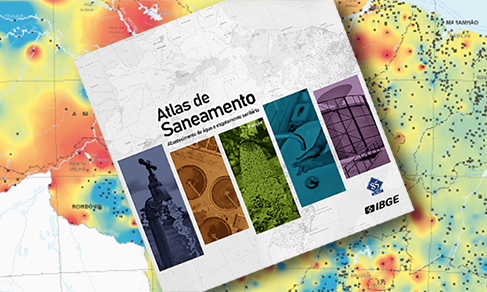Nossos serviços estão apresentando instabilidade no momento. Algumas informações podem não estar disponíveis.
Sanitation Atlas
About the publication - 3rd edition
A central issue in the Brazilian public agenda, universalization of basic sanitation is a challenge yet to be overcome in the country in the 20th century.
With the objective of expanding the debate on this topic, the IBGE brings into view the third edition of the Sanitation Atlas, by means of which it reinforces the commitment of providing updated information not only about the quality of sanitation services in the country but also of issues related to public health, the environment and citizenship involved in this reality. In order to reach this objective, the Institute provides an assessment of the indicators in the National Survey of Basic Sanitation – PNSB 2017, conducted by the Institute, thus strengthening the conviction that the interpretation of statistics is reinforced when associated to the territory-based focus of Geography. To these data were added contributions from other surveys conducted by the IBGE, such as the Survey of Basic Municipal Information – Munic, which, in 2017, investigated this topic as a supplementary edition, besides data from external institutions, such as the Unified Health System Data Processing Department (Datasus), the National Water Agency and Oswaldo Cruz Foundation – Fiocruz, whose valuable contributions led to deeper approaches in this edition, in spatial analysis, such as the hydrographic regions. The correlations with indicators of Sustainable Development Goals (SDG) – presented in some chapters, evidence to what extent this publication is in line with international discussions about the impact of basic sanitation in several dimensions of human health and of the planet.
The publication is organized into five chapters, formed by texts, maps, graphs and tables. The first chapter, Spatial distribution and coverage of water and sewage sanitation networks, deals with the geography of these networks and highlight the deep regional inequalities, despite the increase of water supply services by general systems and of sewage disposal networks since the first PNSB edition, in 1989. The second chapter, Quality and efficiency of sanitation networks, provides a spatial analysis of quality indicators end efficiency of basic sanitation services, with a focus on some of the aspects of collection, transportation, treatment, storage (in the case of water) and distribution (in the case of sewage). The third chapter, Basic sanitation and environment, approaches the integration between these two elements, by using, at times, the territory classification of hydrographic regions, of great importance to the water management in the country. The fourth chapter, Basic sanitation and public health, shows an overall view of these two dimensions combined, having as references the gross cumulative incidence of hospitalizations, as well as the number of cases reported and of deaths caused by diseases related to environmental sanitation between 2007 and 2019. The final chapter, Management of sanitation services, measures the main elements related to the administration of entities that render services in water supply and sewage disposal, in a context of state regulation and institutional normalization. A glossary, at the end of the publication, brings together the concepts considered essential for the understanding of topics approached.
We expect that this Atlas, which is also available at the Interactive Geographic Platform - PGI, on the IBGE website, can help the government and society have better territorial planning aiming at the formulation of local-targeted public policies that will lead to the universalization and improvement of basic sanitation in Brazil.
More on the product - 3rd edition
Interactive Geographic Platform
Publications - 3rd edition
Learn more - 3rd edition
News and Releases
Sanitation atlas spatializes data on the environment and health
Despite the advance in the control of Diseases Related to Poor Environmental Sanitation (DRSAI), they...
24/11/2021
FAQ
What is the Sanitation Atlas?
The Sanitation Atlas provides updated information about sanitation by means of a geographic interpretation of the statistics presented in the National Survey of Basic Sanitation – PNSB. The publication marks the commitment of the Brazilian Institute of Geography and Statistics – IBGE in providing updated information about a key subject of the public health agenda, of sustainability, and of citizenship in the Brazilian society itself. The Sanitation issue, which encompasses a wide range of actions aiming to control environmental conditions and to prevent the diffusion of pathogenic vectors in areas of high population density, requires a multidisciplinary and multiscale approach that can handle the thematic interrelations that have to do with the spatial analysis. This way, the Atlas reinforces the belief that statistical information has its interpretative capacity strengthened, in the complex reality of the contemporary world, when it comes to the territorial approach provided by geography.
What is the National Survey of Basic Sanitation?
The National Survey of Basic Sanitation is mainly intended to investigate the conditions of basic sanitation services in the country, considering municipal governments and companies hired to render this kind of service in the Brazilian municipalities. This investigation, of national coverage, aims not only at the evaluation of the supply and quality of services rendered but also intends to analyze environmental conditions and their direct impact on the Brazilian population’s health and quality of life.
Your question was not answered here?
Please contact us through our service channels.




